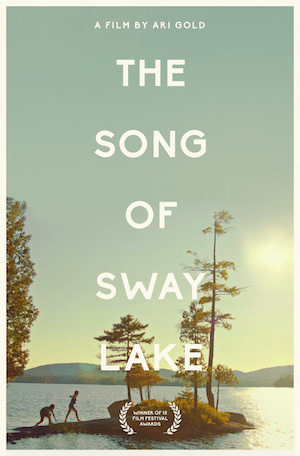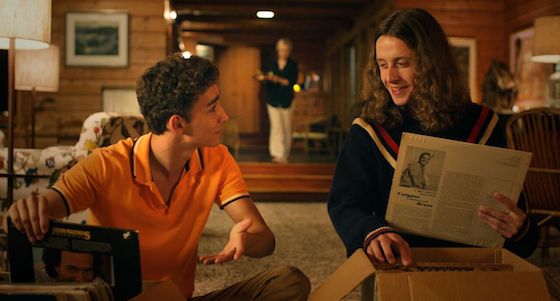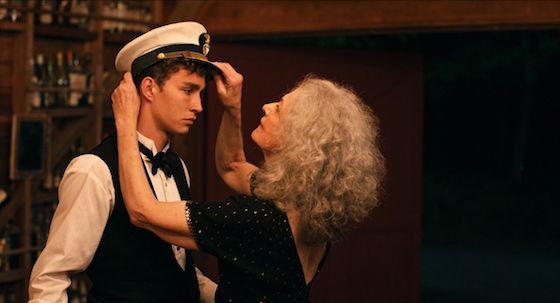

[Rating: Minor Rock Fist Down]
Poet Robert Haas once said that nostalgia “locates desire in the past where it suffers no active conflict and can be yearned toward pleasantly.” And so it is for the characters in The Song of Sway Lake, a harmless little trifle of a film about the weight of memory as seen through the prism of wistful longing. The story of two lost, unmoored people returning to a place from their past so as to find a way into their respective futures, the movie endeavors to tell a story that speaks to legacy and how that’s tied into one’s sense of self. Whether the film succeeds in that endeavor is up for debate, however, as it is beset by listless leads and incomplete ideas that never really blossom.
Set during the summer of 1992, The Song of Sway Lake follows friends Ollie (Rory Culkin) and Nikolai (Robert Sheehan) as they travel to the former’s childhood vacation cottage in upstate New York. A pair of 20-something vagabonds with a car and little else, Ollie and Nikolai hope that they can locate a valuable one-of-a-kind vinyl record in the shuttered estate, which was occupied until recently by Ollie’s dad. In the opening scene, the audience learns that Ollie’s father killed himself earlier in the year, so the young man’s return with Nikolai is a difficult one despite his outward-facing casual demeanor.
The trip is also an opportunity for Ollie and Nikolai to unwind and relax along the peaceful shores of Sway Lake, where they can indulge their laziest fantasies in a “borrowed” cottage to which they have only a tenuous connection. Their plans are interrupted when Ollie’s grandmother, Charlotte (Mary Beth Peil), arrives, halting any further debauchery in her home. Charlotte is also dealing with the loss of Ollie’s father, stating at one point that it’s “harder to lose a son than a father,” but like Ollie, she doesn’t advertise her grief. Although she’s at the opposite end of her life, like Ollie, she seems to be looking for some direction in the cottage (along with the elusive record, which she too is there to collect). The film proceeds thus, with these two emotionally crippled people returning to Sway Lake in search of something that will salve wounds inflicted by a shared loss.

Although the film is about the parallel journeys of Charlotte and Ollie, what’s most interesting is what happens in the wings of this story. Nikolai, a Russian orphan who is eager to absorb and co-opt Ollie’s more stable childhood, is a fascinating counterpoint to all of this. Although Nikolai is also trying to live through a past long since faded to capture a sense of self, the history he gropes at does not belong to him. The young man gets swept up in the idyllic lake and romance gleaned from old letters belonging to Ollie’s grandparents: like a person reading a novel they want to escape into. He’s a far more interesting character than Ollie, who just sort of fumbles through the narrative in the vague search of some emotional closure and a hot-bodied local (the latter sub-plot serving no real purpose to the overall story).
It’s too bad this is the case, for there are a lot of interesting pieces on the board here — they just don’t get used all that well. For example, Charlotte is at the cabin with her maid/personal assistant, Marlena (Elizabeth Pena), who seems to have a long-standing connection with the family, yet she has little to do in the script. What is this character even doing here if she isn’t going to add perspective or put the leads in their place? It’s a waste of a superb actress (who sadly passed away in 2014), and it represents a missed opportunity for a narrative that is in desperate need of some context and weight.

If The Song of Sway Lake is about the power of nostalgia and the pitfalls of living in the past, it only gets itself about halfway to the finish line. Nostalgia can be comforting, yes, and it is often seen through rose-tinted glasses, yet it can also become a trap that skews one’s perception of things. Writer/director Ari Gold never confronts this intriguing contradiction despite a setup that is ripe for just such a reflection. Nikolai and his fascinating identity appropriation crises and Marlena’s just-barely-there presence flirt with interesting, and threaten to fill in these gaps, yet are never able to do so. The sparkling waters, crisp woods, and picturesque cabins all succeed in establishing a sense of place for all of this, yet like Nikolai and Marlena, it isn’t used to much effect.
There are some interesting ideas and engaging performances in The Song of Sway Lake, there’s just not enough connective tissue to bind it together into something greater than the sum of its parts. A standout performance by Sheehan makes the most out of a character that is indeed the most intriguing of the bunch, yet there’s not enough on the page to make his journey worth the watch all by itself. A period piece film that struggles to establish any real connection to the early 90s (Culkin’s hair is about as close as the effort gets), The Song of Sway Lake gets more wrong than it gets right, but at a tidy 90 minutes, it could be a hell of a lot worse.





Comments on this entry are closed.